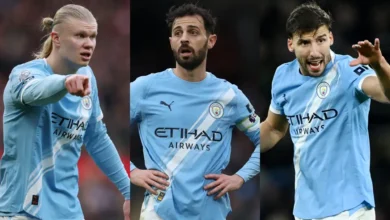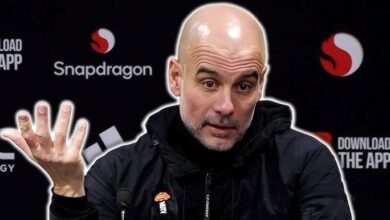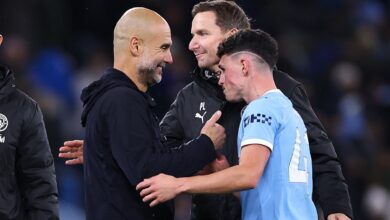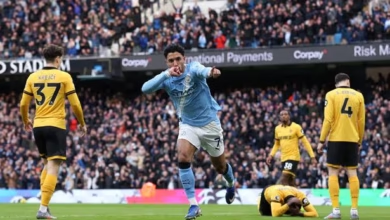We are in trouble…’ Man City fans so annoyed after what they’ve heard about Ilkay Gundogan
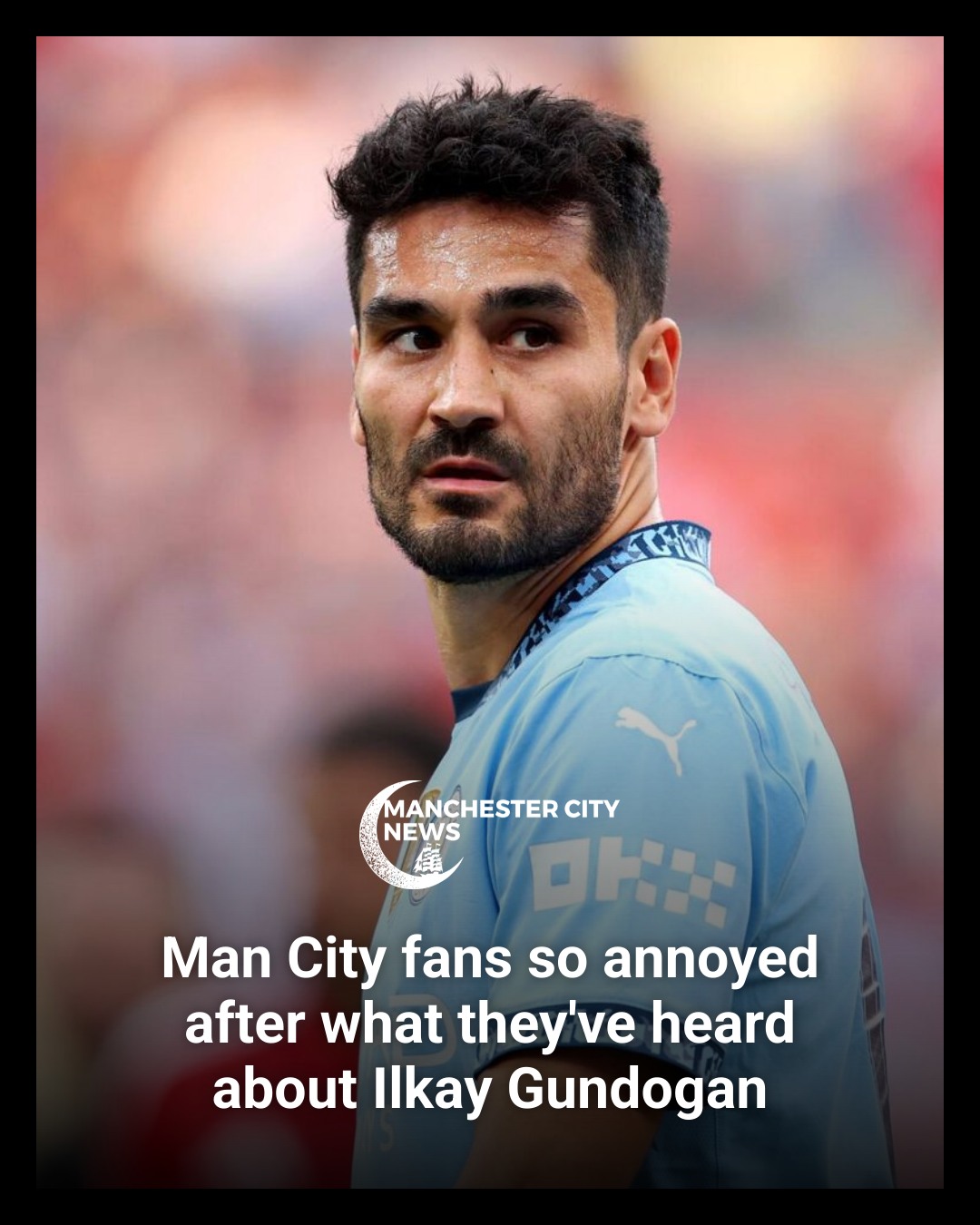
The 34-year-old midfielder, who has been instrumental in Manchester City’s rise to domestic and European dominance, is facing a peculiar predicament. Despite being a club legend with numerous titles to his name, including multiple Premier League championships and the coveted Champions League trophy, Gundogan has become an unlikely target of criticism from the very supporters who once sang his praises from the terraces.
This transformation in fan sentiment represents more than just typical transfer window speculation; it reflects deeper concerns about squad management, financial regulations, and the delicate balance between loyalty to veteran players and the need for strategic renewal in modern football.
The Galatasaray Connection: A Door That Remains Closed
The recent confirmation from Okan Buruk, Galatasaray’s respected manager, has effectively ended any speculation about Gundogan’s potential departure from Manchester. Buruk’s statement, delivered with the diplomatic precision expected of a seasoned football executive, painted a clear picture of the situation while simultaneously revealing the mutual respect that exists between the Turkish giants and the German midfielder.
“Ilkay is not only a very good footballer but also a very good guy,” Buruk explained in his recent press conference. “He thinks a lot about football. He still has a year left on his contract in Manchester. I also think I know he’ll fulfill it there. We like Ilkay Gundogan and we also know he likes Galatasaray very much.”
This statement, while respectful and professionally delivered, has inadvertently become the catalyst for a wave of frustration among Manchester City supporters. The Turkish manager’s words carry particular weight given Galatasaray’s historical connection to German players and their reputation for providing veteran stars with meaningful roles in competitive European football.
Buruk’s acknowledgment that Gundogan “likes Galatasaray very much” suggests that informal discussions or at least preliminary interest may have existed between the parties. However, his definitive stance that the midfielder will “fulfill” his Manchester City contract indicates that any potential move has been effectively ruled out, at least for the immediate future.
The timing of this confirmation is particularly significant, coming as it does during a crucial period in Manchester City’s summer transfer planning. With the new Premier League season approaching and squad registration deadlines looming, the certainty provided by Buruk’s statement forces City’s hierarchy to plan around Gundogan’s continued presence, whether they view it as an asset or a burden.
Fan Reactions: From Worship to Worry
The response from Manchester City supporters to news of Gundogan’s continued stay has been nothing short of dramatic, representing a remarkable shift in public opinion that few could have predicted just a few seasons ago. The German midfielder, who was instrumental in some of the club’s most memorable victories, now finds himself the subject of unprecedented criticism from the fanbase.
Social media platforms have become the primary battleground for expressing these frustrations, with supporters using various channels to voice their concerns about the implications of Gundogan’s continued presence at the club. The reactions range from resigned acceptance to outright anger, with many fans expressing genuine concern about the strategic direction of the team.
One particularly telling response came from a supporter who simply wrote, “We are in trouble,” encapsulating the sense of foreboding that many City fans feel about the upcoming season. This succinct reaction speaks volumes about the perceived impact of Gundogan’s stay on the club’s competitive prospects and tactical flexibility.
Another fan’s response was even more dramatic, declaring, “He will complete it [his contract] here, we are actually finished, guys.” The use of the word “finished” suggests a belief that Gundogan’s continued presence could somehow derail the club’s ambitions or prevent necessary squad evolution.
Perhaps most concerning for the club’s management is the emergence of ultimatum-style demands from supporters. One fan went so far as to suggest that if reports about selling promising young Spanish midfielder Nico Gonzalez while retaining Gundogan prove accurate, it would represent such poor judgment that “we’re absolutely finished as a club and Pep has to leave.”
This particular reaction highlights the complex dynamics at play in modern football squad management, where supporters increasingly view player retention and sales through the lens of long-term strategic planning rather than simple sentiment or loyalty.
The Squad Registration Dilemma
Beyond emotional reactions, many Manchester City supporters have demonstrated a sophisticated understanding of the practical challenges facing the club. The issue of squad registration, particularly regarding the Premier League’s homegrown player rules and Champions League registration requirements, has become a focal point for fan concerns.
One analytically-minded supporter raised crucial questions about squad composition, noting, “If the likes of Gundo, Kova [Mateo Kovacic] and [Manuel] Akanji stay, then I have no idea what they’ll do when it comes to registering players.” This fan’s concern extends beyond individual player quality to encompass the broader challenge of balancing squad numbers with regulatory requirements.
The supporter continued, “They’ll either leave a few out of the CL [Champions League] squad (not great for morale) or loan out younger players.” This observation highlights the cascading effects that squad composition decisions can have on team dynamics, player development pathways, and overall club culture.
Manchester City currently faces the challenge of managing 17 non-homegrown players, a number that creates significant constraints when it comes to squad registration for both domestic and European competitions. The retention of veteran players like Gundogan, while potentially valuable from an experience standpoint, exacerbates these numerical challenges and potentially limits the club’s ability to integrate new signings or promote academy graduates.
These registration concerns are not merely administrative inconveniences; they represent fundamental strategic decisions about the club’s direction and priorities. The choice to retain experienced players over creating space for new acquisitions or youth development reflects broader philosophical questions about team building in modern football.
Tactical Concerns and Recent Performance
The criticism of Gundogan extends beyond squad logistics to encompass tactical and performance-related concerns. Several supporters have specifically referenced his recent appearances, particularly during Manchester City’s participation in the FIFA Club World Cup, as evidence of declining effectiveness on the pitch.
One frustrated fan directly criticized Pep Guardiola’s team selection decisions, arguing, “Of course he will [stay] because he won’t take a pay cut and Pep stupidly gave him loads of minutes at the CWC [Club World Cup].” This comment reveals multiple layers of concern, including questions about Guardiola’s judgment, Gundogan’s wage demands, and his current level of performance.
The reference to the Club World Cup is particularly significant, as this tournament provided City fans with their most recent extended look at Gundogan in action. For supporters who were hoping to see reduced playing time as a precursor to departure, his continued involvement in important matches sent a concerning signal about the club’s intentions.
The same supporter concluded with a direct appeal to Guardiola: “Game one, Pep needs to do the right thing and leave him out.” This demand for immediate benching reflects the depth of frustration and the belief that continued selection could be detrimental to the team’s prospects.
Such tactical concerns are not uncommon in football, but they take on added significance when directed at a player of Gundogan’s stature and historical importance to the club. The fact that supporters are willing to call for the benching of a club legend indicates the severity of their concerns about his current contribution levels.
Comparative Market Analysis
The frustration with Gundogan’s situation has been amplified by Manchester City supporters’ perception of rival clubs’ transfer activities. The sense that other Premier League teams are making significant improvements while City remains static has become a recurring theme in fan discussions.
One supporter captured this sentiment perfectly, writing, “Another year of Gundo, Kova and Bernardo whilst other teams are strengthening.” This comment reflects a broader concern about competitive advantage and the fear that standing still in the transfer market is equivalent to moving backward relative to rivals.
The inclusion of Mateo Kovacic and Bernardo Silva in this criticism alongside Gundogan suggests that fan concerns extend beyond individual players to encompass broader questions about squad renewal and strategic planning. These three players, while undoubtedly talented, represent significant combined wages and squad spaces that could potentially be utilized differently.
The reference to “other teams strengthening” acknowledges the competitive reality of the Premier League, where clubs must continuously evolve to maintain their position. Arsenal, Liverpool, Chelsea, and other rivals have all made notable signings during recent transfer windows, creating additional pressure on City to respond in kind.
This comparative analysis by supporters demonstrates a sophisticated understanding of football economics and competitive dynamics. Rather than viewing the situation in isolation, they’re contextualizing Gundogan’s retention within the broader landscape of Premier League competition and transfer activity.
Historical Context and Legacy Protection
To fully understand the current situation, it’s essential to acknowledge Ilkay Gundogan’s remarkable contribution to Manchester City’s success over the past several seasons. The German midfielder has been instrumental in the club’s transformation from ambitious upstarts to established European giants, playing crucial roles in multiple title-winning campaigns.
Gundogan’s technical ability, tactical intelligence, and leadership qualities have been consistently praised by teammates, coaches, and analysts throughout his tenure at the Etihad Stadium. His performances in crucial matches, including several memorable Champions League encounters and title-deciding Premier League fixtures, have cemented his status as one of the club’s most important players of the modern era.
The midfielder’s versatility has been particularly valuable to Pep Guardiola’s tactical system, allowing him to operate effectively in various positions and roles depending on the team’s needs. His ability to control tempo, create chances, and contribute defensively has made him an invaluable asset in the manager’s preferred style of play.
However, football is ultimately a results-driven business where sentiment and history can only carry players so far. The current fan criticism, while harsh, reflects genuine concerns about whether Gundogan can continue to perform at the level required for Manchester City’s ambitions at this stage of his career.
Financial Implications and Contract Considerations
The financial aspects of Gundogan’s situation add another layer of complexity to the current debate. As one supporter noted, the player’s reluctance to accept a pay cut may be influencing his decision to remain at Manchester City rather than pursue opportunities elsewhere.
Professional footballers, particularly those at Gundogan’s level, command substantial wages that reflect both their ability and market value. At 34 years old, this may represent his final opportunity to earn at the highest level, making financial considerations understandably important in any decision-making process.
Manchester City’s wage structure, like that of most elite clubs, includes performance-related bonuses and loyalty payments that can make contract fulfillment more attractive than early departure. The club’s success in recent seasons means that players like Gundogan have likely earned substantial bonus payments, further incentivizing contract completion.
From the club’s perspective, moving on high-earning veteran players can free up significant resources for new signings or contract extensions for other key players. However, the timing and availability of suitable replacements, combined with the challenges of finding clubs willing and able to match current wage levels, can complicate such transitions.
Potential Solutions and Future Scenarios
Despite the current tension, several potential scenarios could help resolve the situation in a manner that benefits all parties involved. The most optimistic outcome would see Gundogan return to his previous high standards of performance, silencing critics and justifying the club’s faith in his continued contribution.
Football history is replete with examples of veteran players who have defied age-related concerns to deliver crucial contributions in their twilight years. If Gundogan can rediscover his best form, the current criticism would likely evaporate as quickly as it emerged, replaced by appreciation for his experience and quality.
Alternatively, a carefully managed transition could see Gundogan’s role gradually reduced throughout the season, preparing both him and the fanbase for an eventual departure. This approach would require delicate handling from Guardiola to maintain squad harmony while ensuring competitive standards.
The possibility of a January transfer window move should not be entirely dismissed, particularly if the situation fails to improve by the midpoint of the season. Turkish clubs like Galatasaray, along with other European leagues, could provide attractive destinations for a player of Gundogan’s caliber seeking regular playing time.
Broader Implications for Squad Management
The Gundogan situation highlights broader challenges facing elite football clubs in managing squad transitions and maintaining competitive standards. The balance between respecting veteran contributions and making necessary changes for future success requires careful consideration and strategic planning.
Manchester City’s approach to this situation will likely influence how other clubs handle similar scenarios with aging star players. The precedent set could impact future contract negotiations, transfer strategies, and relationship management between clubs and supporters.
The role of fan opinion in modern football continues to evolve, with social media providing unprecedented platforms for supporter voice and influence. Clubs must navigate these dynamics while maintaining focus on their sporting and commercial objectives.
Conclusion: A Test of Championship Mettle
As Manchester City prepares for another challenging season across multiple competitions, the Ilkay Gundogan situation represents both a test of squad management and an opportunity for redemption. The German midfielder, despite current criticism, remains a player of proven quality and experience who could yet play a crucial role in the club’s continued success.
The ultimate resolution of this situation will likely depend on performances on the pitch rather than speculation in the media. If Gundogan can demonstrate that he retains the ability to contribute meaningfully to Manchester City’s objectives, current concerns may prove premature. However, if the fears of supporters prove justified, the club may need to reassess their approach to squad management and veteran player retention.
For now, the football world watches with interest as one of the Premier League’s most successful clubs navigates the delicate balance between loyalty and ambition, between respecting the past and preparing for the future. The outcome will undoubtedly influence similar situations across football and provide valuable lessons about the evolving relationship between clubs, players, and the supporters who form the heart of the beautiful game.







